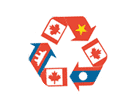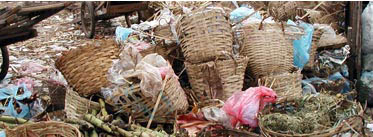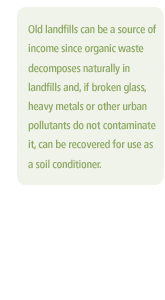



In the summer of 2002, Waste-Econ expanded its activities into Laos and Cambodia. The staggered timing of activities in the three countries is allowing opportunities for our partners in Laos and Cambodia to benefit from the experience of our Vietnamese partners. Lessons learned are passed along through international conferences, meetings and less formal interactions.
Our primary partner in Laos is the National Science Council, an institute which has responsibility for academic and professional organizations in the country and also provides post-graduate training opportunities. We are also working with the Faculty of Agriculture at the National University of Laos.
CAPACITY BUILDING THROUGH TRAINING
As of January 2004, Laos has conducted a six-week training course (in Vientiane) and one two-week provincial training course (in Champasack) resulting in over 75 professionals from a variety of sectors trained in the theory and practice of the waste economy. The courses presented focused on: urban solid waste management, industrial waste management (presented by one of our Vietnamese partners), research methods, economics of waste management, public health and the informal sector's role in the waste economy. An additional two-week training course is proposed for 2004.
In January 2004, the National Science Council, in cooperation with the Ontario Centre for Environmental Technology Advancement (OCETA), delivered a workshop on environmental management systems and cleaner production for the woodworking sector in Vientiane. Over 30 people attended the workshop and participants initiated plans for development of a woodworking industry association in Laos.
As preparation for the pilot project (discussed below) Waste-Econ offered detailed training workshops to a total of 30 participants each on composting economics, waste audits and composting techniques.
EXPANDING RESEARCH CAPACITY THROUGH PILOT PROJECTS
Composting market waste as an economically self-sufficient and sustainable method of integrated waste management: The goal of the pilot project is to divert organic waste from the markets in Vientiane to a compost site that will produce compost for sale to local farmers. For the composting phase the Prime Ministers Office has agreed to host the compost site within its government compound. During 2003, pilot project team members from the National University and the National Science Council worked with University of Toronto graduate students to conduct waste audits, determine the local willingness to source-separate the waste and determine the potential market for the final product. In early 2004, the National Science Council established a demonstration composting site and provided training to waste collectors and market vendors who are separating waste for the site.
